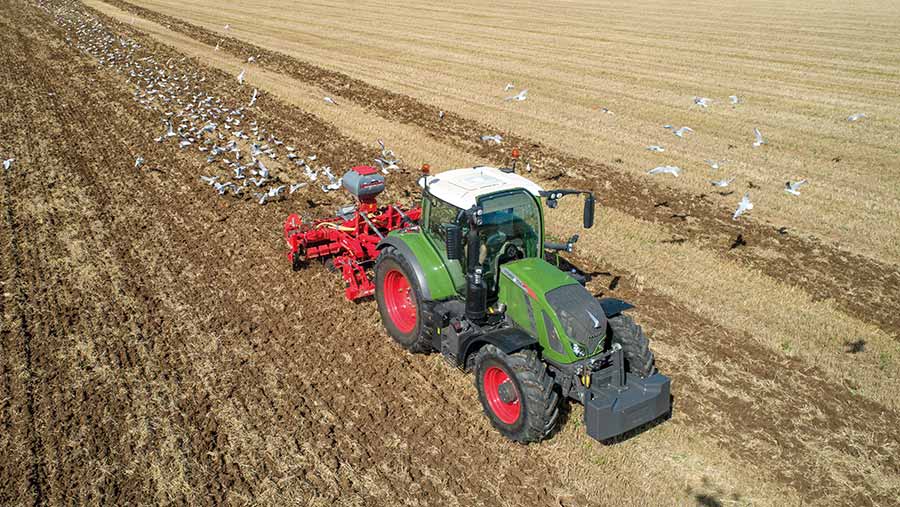Why primed OSR seed could help with crop establishment
 © Gary Naylor
© Gary Naylor A new oilseed rape variety will be available this summer only as primed seed which is aimed at helping with early establishment and coping with early pest attacks and dry weather.
Seed of the variety Tennyson from Elsoms Seeds will only be sold as primed next season, meaning the seed is treated with moisture and heat to get it to the point of germination, so when it hits the soil it should establish better than non-primed seed.
Jack Holgate, crop manager for break and cover crops at the company, says there should be a good supply of seed this summer and although there will be an added cost, there should be no need for nutrient or chemical seed dressing.
“We see this as a sustainable way of getting good establishment and to get the crop up and away to counter any flea beetle or environmental concerns,” he says.
See also: Oilseed rape makes a return with an early start
High-value vegetable seed
Priming seed is already common for high-value vegetable crops such as carrots, onions and parsnips to give even germination. The technique is also used in sugar beet seed, and Elsoms is already a leader in the vegetable seed sector.
The process can take more than a week, so the Tennyson seed available this summer will have been over-yeared, and will have come from crops harvested in the summer of 2021.
“The big advantage is that it gives fast and even establishment, and we have also seen some yield improvements in our trials,” says Mr Holgate.
The variety also has very good phoma resistance, which isn’t reliant on the RLM7 gene.
Although this gene remains effective in the UK, there are signs it has started to break down in France, making the variety’s polygenetic resistance important.
Quicker germination
David Leaper, seed technical specialist at Agrii, says the priming process speeds up germination, so it is good for drier conditions as the seed has already imbibed much of the moisture it needs to germinate.
Therefore, primed seed can germinate two to three days faster than non-primed seed.
“Farmers see flea beetle as a massive risk, and early drilling to limit this risk puts the oilseed rape crop under pressure from a lack of moisture, so primed seed could help,” he says.
Final pricing for the niche seed treatment in its first commercial year is unlikely to be much different from normal hybrid oilseed rape seed, say traders.
Mr Leaper says seed treatments can be used to enhance early vigour, but they have no effect on germination and emergence of the seed, and he suggests that a combination of primed seed and Integral Pro could offer a sustainable and full non-chemical treatment for oilseed rape.
Integral Pro is the first widely used biological treatment in arable farming. Based on a bacillus (B amyloquefaciens), it controls damping off, stimulates early growth and reduces light to moderate attacks from cabbage stem flea beetles.
Brexit delays
Mr Leaper believes there will be an increased reliance on over-yeared seed following Brexit delays to deliveries of oilseed rape seed from the earlier areas of Europe, such as the south of France, and new seed can not always be supplied for that summer’s seed crops.
“We do see a big move to purchase seed in July, and this has to be over-yeared seed,” he says.
In addition, as the threat from flea beetles has pushed drilling earlier to establish the crop before the main pest migration period, earlier deliveries of seed could become common.
He says his company has seen strong demand for intentionally over-yeared seed, which the group refers to as “reserved seed”.
The variety Tennyson was added to the AHDB East/West region Recommended List (RL) at the end of last year, and its combination of a good disease resistance package and stem stiffness makes it an ideal candidate for early drilling.
The variety has been highlighted as having the highest resistance to phoma stem canker, which is based on different genetics to most varieties on the RL.
It scores a 9 for phoma resistance and a 7 for light leaf spot on a 1-9 scale where 1 is susceptible and 9 shows good resistance. It is also resistant to turnip yellows virus.
Mr Leaper says the variety can be drilled from early August right through to early September, and it has shown good stem stiffness and lodging resistance in his company’s trials.
It has a fast autumn development and a relatively early spring regrowth habit.
Tennyson v top-yielding variety on East/West Recommended List |
||
| Variety | Tennyson | Adonis |
| Gross output (East/West) | 104% | 108% |
| Resistance to lodging | 8 | 8 |
| Light leaf spot | 7 | 7 |
| Stem canker |
9 |
8 |
| Turnip yellows virus | R | R |
| Lodging and disease rated on a 1-9 scale, with 9 showing the most resistance |
||

